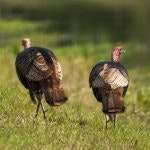Let’s Talk Turkey

December 12, 2022 By Katie Roundtree
With the holiday season in full swing, our thoughts turn to entertaining and, inevitably, turkey, a staple at many family dinner tables. These tasty birds are also native to our area and quite common if you are lucky enough to spot them. However, South Florida turkeys aren’t like the plastic-wrapped birds we find in our local markets. They are a bit less plump and round, weighing about 17 pounds.
Wild turkeys are social animals and typically flock together in groups numbering just a few birds to as many as 20 or more. Wild turkeys roost at night in trees within thicker forest stands for safety from ground predators. They are extremely wary and will run away or fly to a tree to escape danger. Turkeys have excellent eyesight, including the ability to see color.
They are powerful fliers, especially for short distances, and can fly up to 55 miles per hour!
However, to conserve energy, wild turkeys primarily walk. They spend most of their time on the ground, where they search for acorns, seeds, fruits, insects, leaves, and small vertebrates. They can easily cover several hundred acres in a day.
Before Europeans came to North America, the wild turkey population was abundant. They declined in number from hunting and habitat takeover by humans after Europeans arrived, but in 1860 there were still more turkeys in Florida than people. During the early 1900s, there was a considerable decline in the turkey population throughout Florida. By 1975, the Florida Fish and Wildlife Conservation Commission managed wild turkeys. Now, turkeys can be found in all of Florida’s counties and in every state in the United States except Alaska and Hawaii.
Florida is home to two subspecies of wild turkey — the eastern wild turkey (Meleagris gallopavo silvestris) and the Osceola or Florida wild turkey (M.g. osceola). The Florida wild turkey is best distinguished from the eastern subspecies, which it closely resembles, by the white barring on its wing feathers. On Florida wild turkeys, the white bars on the primary wing feathers are narrower than the black bars. They are irregular or broken, giving the wing an overall darker appearance than eastern wild turkeys.
An adult male wild turkey is thick-bodied and larger than a female. The skin on its featherless head is pinkish-red with red caruncles (wattles) on its throat and neck. It has a dark beard on its breast and dark brown or bronze iridescent feathers. Males, called “gobblers,” have elaborate tail feathers used during mating. They also have spurs on their strong feet, beards, and “snoods” that hang over their beaks.
The female, or ‘hen,” is slimmer and duller looking than the male, with a blue-gray head and neck that lacks the prominent red caruncles of males. Females usually do not have a beard, but if one is present, it is thinner and smaller than the males.
An adolescent male is called a “jake,” and an adolescent female is called a “jenny.” A baby turkey of either gender is called a “poult.” Wild turkey hens in Florida typically begin nesting in late March or early April. The female builds a shallow nest on the ground where she lays an average of 9 to11 eggs. It takes approximately 12-13 days to lay the entire clutch of eggs and another 25-26 days of continuous incubation for them to hatch. Newly hatched wild turkeys, called poults, are highly mobile and can feed themselves soon after hatching. Poults are flightless until they are about two weeks old. After two weeks, the chicks can fly up to trees to roost to escape predators, including coyotes, raccoons, owls, snakes, bobcats, eagles, foxes and hawks.
Turkeys are large animals (males can stand 3.5 feet tall) with powerful wings and sharp spurs on their legs. If wild turkeys visit your yard, it is essential to allow them to stay wild by not feeding them. Wild turkeys need to move about large tracts of land looking for food, and providing them with food encourages them to stay in one place. Additionally, feeding any wild animal can cause it to lose its natural fear of people and lead to them becoming pushy or aggressive to get more food. Not only can human-fed turkeys become aggressive toward the hands that feed them, but they may also scratch and peck cars, leave droppings in undesired areas, and tear up landscaping.
One last fact about turkeys, the story about Benjamin Franklin wanting the National Bird to be a turkey is just a myth. This false story began due to a letter Franklin wrote to his daughter. In the letter, Franklin wrote, “For my own part I wish the bald eagle had not been chosen as the representative of our country.” He felt that the “Bald Eagle…is a Bird of bad moral Character. He does not get his Living honestly…[he] is too lazy to fish for himself.” (Bald eagles sometimes steal the fish from other birds rather than fish for themselves) Franklin wrote that in comparison to the bald eagle, the turkey is “a much more respectable Bird, and withal a true original Native of America…He is besides, though a little vain & silly, a Bird of Courage.” So, although Benjamin Franklin defended the honor of the turkey against the bald eagle, he did not propose it becoming one of America’s most important symbols.
